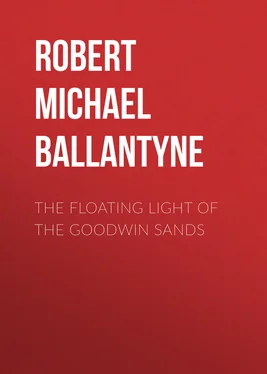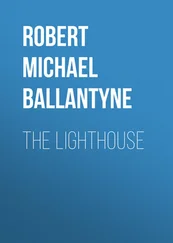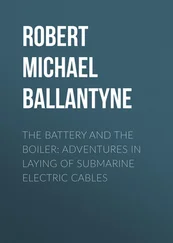Robert Michael Ballantyne - The Floating Light of the Goodwin Sands
Здесь есть возможность читать онлайн «Robert Michael Ballantyne - The Floating Light of the Goodwin Sands» — ознакомительный отрывок электронной книги совершенно бесплатно, а после прочтения отрывка купить полную версию. В некоторых случаях можно слушать аудио, скачать через торрент в формате fb2 и присутствует краткое содержание. Жанр: foreign_children, literature_19, foreign_antique, foreign_prose, на английском языке. Описание произведения, (предисловие) а так же отзывы посетителей доступны на портале библиотеки ЛибКат.
- Название:The Floating Light of the Goodwin Sands
- Автор:
- Жанр:
- Год:неизвестен
- ISBN:нет данных
- Рейтинг книги:4 / 5. Голосов: 1
-
Избранное:Добавить в избранное
- Отзывы:
-
Ваша оценка:
- 80
- 1
- 2
- 3
- 4
- 5
The Floating Light of the Goodwin Sands: краткое содержание, описание и аннотация
Предлагаем к чтению аннотацию, описание, краткое содержание или предисловие (зависит от того, что написал сам автор книги «The Floating Light of the Goodwin Sands»). Если вы не нашли необходимую информацию о книге — напишите в комментариях, мы постараемся отыскать её.
The Floating Light of the Goodwin Sands — читать онлайн ознакомительный отрывок
Ниже представлен текст книги, разбитый по страницам. Система сохранения места последней прочитанной страницы, позволяет с удобством читать онлайн бесплатно книгу «The Floating Light of the Goodwin Sands», без необходимости каждый раз заново искать на чём Вы остановились. Поставьте закладку, и сможете в любой момент перейти на страницу, на которой закончили чтение.
Интервал:
Закладка:
R. M. Ballantyne
The Floating Light of the Goodwin Sands
Preface
This tale, reader—if you read it through—will give you some insight into the condition, value, and vicissitudes of the light-vessels, or floating lighthouses, which guard the shores of this kingdom, and mark the dangerous shoals lying off some of our harbours and roadsteads. It will also convey to you—if you don’t skip—a general idea of the life and adventures of some of the men who have manned these interesting and curious craft in time past, as well as give you some account of the sayings and doings of several other personages more or less connected with our coasts. May you read it with pleasure and profit, and—“may your shadow never be less.”
I gratefully express my acknowledgment and tender my best thanks to the Elder Brethren of the Trinity House, to whose kindness I am indebted for having been permitted to spend a week on board the Gull-stream light-vessel, one of the three floating-lights which mark the Goodwin Sands; and to Robin Allen, Esquire, Secretary to the Trinity House, who has kindly furnished me with valuable books, papers, and information. I have also gratefully to tender my best thanks to Captain Valle, District Superintendent under the Trinity House at Ramsgate, for the ready and extremely kind manner in which he afforded me every facility for visiting the various light-vessels and buoys of his district, and for observing the nature and duties of the service.
To the master of the Gull, whose “bunk” I occupied while he was on shore—to Mr John Leggett, the mate, who was in command during the period of my visit—and to the men of the “Floating-light” I have to offer my heartfelt thanks for not only receiving me with generous hospitality, but for treating me with hearty goodwill during my pleasant sojourn with them in their interesting and peculiar home.
My best thanks, for much useful and thrilling information, are due to Mr Isaac Jarman, the coxswain, and Mr Fish, the bowman, of the Ramsgate Lifeboat-men who may be said to carry their lives continually in their hands, and whose profession it is to go out at the call of duty and systematically grapple with Death and rob him of his prey. To the Harbour Master, and Deputy Harbour Master at Ramsgate, I am also indebted for information and assistance, and to Mr Reading, the master of the Aid steam-tug, which attends upon, and shares the perils of, the Lifeboat.
R.M. Ballantyne .
Edinburgh, 1870 .
Chapter One.
Particular Inquiries
A light—clear, ruddy and brilliant, like a huge carbuncle—uprose one evening from the deep, and remained hovering about forty feet above the surface, scattering its rays far and wide, over the Downs to Ramsgate and Deal, along the coast towards Dover, away beyond the North Foreland, across the Goodwin Sands, and far out upon the bosom of the great North Sea.
It was a chill November evening, when this light arose, in the year—well, it matters not what year. We have good reasons, reader, for shrouding this point in mystery. It may have been recently; it may have been “long, long ago.” We don’t intend to tell. It was not the first time of that light’s appearance, and it certainly was not the last. Let it suffice that what we are about to relate did happen, sometime or other within the present century.
Besides being cold, the evening in question was somewhat stormy—“gusty,” as was said of it by a traveller with a stern visage and remarkably keen grey eyes, who entered the coffee-room of an hotel which stood on the margin of Ramsgate harbour facing the sea, and from the upper windows of which the light just mentioned was visible.
“It is, sir,” said the waiter, in reply to the “gusty” observation, stirring the fire while the traveller divested himself of his hat and greatcoat.
“Think it’s going to blow hard?” inquired the traveller, planting himself firmly on the hearth-rug, with his back to the fire, and his thumbs hooked into the armholes of his waistcoat.
“It may, sir, and it may not,” answered the waiter, with the caution of a man who has resolved, come what may, never to commit himself. “Sometimes it comes on to blow, sir, w’en we don’t look for it; at other times it falls calm w’en we least expects it. I don’t pretend to understand much about the weather myself, sir, but I shouldn’t wonder if it was to come on to blow ’ard. It ain’t an uncommon thing at Ramsgate, sir.”
The traveller, who was a man of few words, said “Humph!” to which the waiter dutifully replied “Yessir,” feeling, no doubt, that the observation was too limited to warrant a lengthened rejoinder.
The waiter of the Fortress Hotel had a pleasant, sociable, expressive countenance, which beamed into a philanthropic smile as he added—
“Can I do anything for you, sir?”
“Yes—tea,” answered the traveller with the keen grey eyes, turning, and poking the fire with the heel of his boot.
“Anything with it, sir?” asked the waiter with that charmingly confident air peculiar to his class, which induces one almost to believe that if a plate of elephant’s foot or a slice of crocodile’s tail were ordered it would be produced, hot, in a few minutes.
“D’you happen to know a man of the name of Jones in the town?” demanded the traveller, facing round abruptly.
The waiter replied that he had the pleasure of knowing at least seven Joneses in the town.
“Does one of the seven deal largely in cured fish and own a small sloop?” asked the traveller.
“Yessir, he do, but he don’t live in Ramsgate; he belongs to Yarmouth, sir, comes ’ere only now and then.”
“D’you know anything about him?”
“No, sir, he don’t frequent this ’otel.”
The waiter said this in a tone which showed that he deemed that fact sufficient to render Jones altogether unworthy of human interest; “but I believe,” he added slowly, “that he is said to ’ave plenty of money, bears a bad character, and is rather fond of his bottle, sir.”
“You know nothing more?”
“Nothing, sir.”
“Ham and eggs, dry toast and shrimps,” said the keen-eyed traveller in reply to the reiterated question.
Before these viands were placed on the table the brief twilight had passed away and darkness en-shrouded land and sea. After they had been consumed the traveller called for the latest local paper, to which he devoted himself for an hour with unflagging zeal—reading it straight through, apparently, advertisements and all, with as much diligence as if it were a part of his professional business to do so. Then he tossed it away, rang the bell, and ordered a candle.
“I suppose,” he said, pointing towards the sea, as he was about to quit the room, “that that is the floating light?”
“It is one of ’em, sir,” replied the waiter. “There are three lights on the sands, sir; the Northsan ’ead, the Gull-stream, and the Southsan ’ead. That one, sir, is the Gull.”
“How far off may it be?”
“About four miles, sir.”
“What is the mate’s name?”
“Welton, sir, John Welton.”
“Is he aboard just now?”
“Yessir, it’s the master’s month ashore. The master and mate ’ave it month an’ month about, sir—one month afloat, next month ashore; but it seems to me, sir, that they have ’arder work w’en ashore than they ’ave w’en afloat—lookin’ after the Trinity stores, sir, an’ goin’ off in the tender to shift and paint the buoys an’ such like; but then you see, sir, w’en it’s their turn ashore they always gits home to spend the nights with their families, sir, w’ich is a sort of compensation, as it were,—that’s where it is, sir.”
Читать дальшеИнтервал:
Закладка:
Похожие книги на «The Floating Light of the Goodwin Sands»
Представляем Вашему вниманию похожие книги на «The Floating Light of the Goodwin Sands» списком для выбора. Мы отобрали схожую по названию и смыслу литературу в надежде предоставить читателям больше вариантов отыскать новые, интересные, ещё непрочитанные произведения.
Обсуждение, отзывы о книге «The Floating Light of the Goodwin Sands» и просто собственные мнения читателей. Оставьте ваши комментарии, напишите, что Вы думаете о произведении, его смысле или главных героях. Укажите что конкретно понравилось, а что нет, и почему Вы так считаете.












